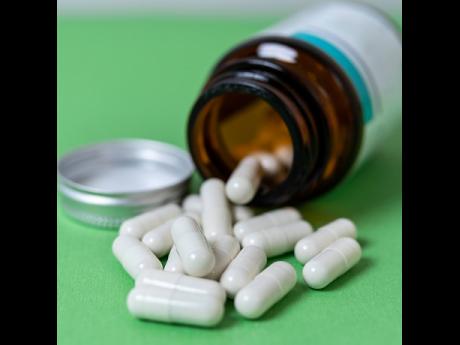Common nutrient deficiencies – Know the signs
YOU MAY think nutrient deficiencies are a thing of the past, but even today, it is possible to lack some of the essential nutrients your body needs to function optimally.
Nutrient deficiencies alter bodily functions and processes at the most basic cellular level. These processes include water balance, enzyme function, nerve signalling, digestion, and metabolism. Resolving these deficiencies is important for optimal growth, development, and function.
Dr Orlando Thomas, medical doctor and functional medicine practitioner at Thomas Medical Centre, said telltale symptoms are usually the first clue that you are low in one or more important vitamins or minerals.
“If you suspect you have a nutrient deficiency, talk to your doctor. Blood tests can help determine if you are deficient. The best way to avoid or remedy nutrient deficiencies is to make sure you are eating a balanced, nutrient-rich diet. I encourage food first, as nature has them in the right balance,” Dr Thomas said.
Some nutrient deficiencies can have severe symptoms and limit your ability to accomplish daily tasks. These can include magnesium, calcium, iron, zinc, copper, selenium and potassium. \
MAGNESIUM
Magnesium helps support bone health and assists in energy production, and adults need between 310 and 420mg per day, depending on sex and age. Although deficiency is fairly uncommon in otherwise healthy people, certain medications, including some antibiotics and diuretics, and health conditions such as type 2 diabetes and Crohn’s disease can limit the absorption of magnesium or increase the loss of this nutrient from the body.
“Magnesium deficiency can cause poor memory, blood pressure, moodiness, irritability, asthma; and it may also lead to numbness and tingling, muscle cramps or contractions, seizures, irregular heart rhythms, personality changes, or coronary spasms. To help your levels return to normal, eat more magnesium-rich foods, such as almonds, cashews, peanuts, sunflower seeds, pumpkin seeds, chocolate and ripe bananas,” Dr Thomas said.
CALCIUM
Our body needs calcium to promote bone growth and muscle strength. The effects of calcium deficiency might not show up immediately; in fact, calcium deficiency can strike in senior populations and cause brittle bones or low bone density.
“It is important to focus on getting the right amount of calcium in your diet. Common food sources include dairy products, almond milk, fortified foods, kale and broccoli. Intake requirements vary depending on a variety of factors. However, it can be bad for you to take calcium supplements; try taking in calcium in the food that you eat,” Dr Thomas said.
Most adults need 1,000 milligrams (mg) of calcium each day, though women over 50 and men over 70 need 1,200mg. You will likely get enough from at least three servings of milk or yogurt a day. Cheese is another good source of calcium, but if you are unable to have diary, you can find this nutrient in calcium-fortified orange juice, breakfast cereal and dark, leafy vegetables.
IRON
Iron deficiency is the most common nutritional deficiency worldwide and is one of the leading factors contributing to the global burden of disease. Iron deficiency can also lead to anaemia, a blood condition that results in fatigue, weakness, dizziness, and low immune support.
The World Health Organization estimates that iron deficiency and anaemia affect 42 per cent of children under five and 40 per cent of pregnant women worldwide. Those most likely to experience iron deficiency include teenage girls, very young children, and those who choose plant-based diets.
“Iron is necessary to produce red blood cells, which carry oxygen throughout the body. Low iron can leave you with symptoms including weakness and fatigue, shortness of breath, a fast heartbeat, pale skin, headache, cold hands and feet, a sore or swollen tongue, brittle nails, and cravings for strange things, like dirt,” Dr Thomas said.
To boost iron levels, Dr Thomas recommends eating liver, beef, dark chocolate, mushroom, callaloo and molasses. You can take iron supplements, if recommended by your doctor. However, too much iron can be dangerous to your health. Adult men and women over 50 need eight milligrams per day, and adult women younger than 50 need 18mg each day.
POTASSIUM
Meanwhile, potassium helps your heart, nerves, and muscles work properly, and also delivers nutrients to cells, while removing waste. It is a useful nutrient that helps offset sodium’s negative impact on your blood pressure.
“Symptoms of potassium deficiency include muscle weakness, twitches, or cramps; constipation; tingling and numbness; and an abnormal heart rhythm, or palpitations.
For natural potassium sources, try bananas, milk, lentils, kidney beans and other legumes. The recommended potassium intake is 4,700mg per day,” Dr Thomas said.
ZINC
On the other hand, zinc deficiency is when the body does not have enough of the mineral zinc. Zinc is important for the immune system, wound healing, and normal growth and development during pregnancy, childhood and adolescence.
“Zinc deficiency can result in skin changes that look like eczema at first. There may be cracks and a glazed appearance on the skin, often found around the mouth, nappy area and hands. The rash does not get better with moisturisers or steroid creams or lotions,” Dr Thomas said.
Interestingly, zinc may inhibit the absorption of copper, leading to reduced copper levels and a potential copper deficiency. This deficiency is due to an interaction between zinc and copper, where zinc inhibits the intestinal absorption of copper.
COPPER
“Copper is an essential trace element and deficiency may result in anaemia, leucopenia, neutropenia and thrombocytopenia. Early diagnosis is important to avoid the possibility of developing disabling and frequently irreversible neurological symptoms,” Dr Thomas said.
SELENIUM
The body also needs small amounts of selenium to help with our thyroid hormones. Selenium is a trace mineral, which means that the body only needs a small amount of it. It is found naturally in foods and is an essential component of various enzymes and proteins called selenoproteins, that help to make DNA and protect against cell damage and infections.
These proteins are also involved in reproduction and the metabolism of thyroid hormones. Most selenium in the body is stored in muscle tissue, although the thyroid gland holds the highest concentration of selenium due to various selenoproteins that assist with thyroid function.
Protein foods from animals are generally good sources of selenium. Seafood, organ meats, and Brazil nuts are the foods highest in selenium, although most of your selenium can come from everyday staples like breads, cereals, poultry, red meat, and eggs.
“Micronutrient deficiencies can cause visible and dangerous health conditions, but they can also lead to less clinically notable reductions in energy level, mental clarity and overall capacity. This can lead to reduced educational outcomes, reduced work productivity, and increased risk from other diseases and health conditions,” Dr Thomas said.
Many of these deficiencies are preventable through nutrition education and having a healthy diet containing diverse foods, as well as food fortification and supplementation, where needed.


